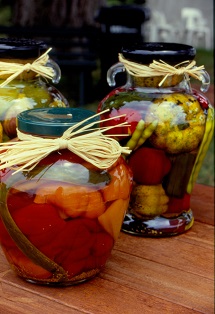
We've been working on an article on pickles for the next Home Grown Magazine; out late February; which is a great time to preserve that extra fruit and veg from the garden.
If you want to know more about pickles and other forms of food preserving, we can help with courses (eg. Self Sufficiency, Food Preparation) on this site; or our ebook "
Food Preservation -click for our bookshop
Here's an extract from our ebook:
Pickles, chutney and sauces – the life of a plate – delicious creations that turn an ordinary dish into an extraordinary dish. Pickles, chutneys and sauces are a great way to preserve excess produce, creating interesting bursts of flavour to add to meals. Whilst different in flavour, texture and appearance – pickles, chutneys and sauces are all primarily preserved by the action of vinegar (acid). The slow cooking, salt, sugar and spices also help to preserve them, giving a relatively long storage life (approximately a year), with the flavour improving over time.
Flavour is created from combinations of produce, vinegar, spices, salt, and sugar. There are many different combinations to try, creating ample opportunity to be creative.
Pickles: Usually vegetables (sometimes fruit) preserved in vinegar and salt with spices. Pickles are often made without heating the produce. Pickles generally retain the shape, colour and texture of the vegetable.
Chutneys: fruit or vegetables preserved in vinegar, spices, salt and sugar; prepared by slow cooking until it turns into a jam-like consistency.
Sauces: Similar to chutneys, sauces are fruit or vegetables preserved in vinegar, spices, salt and sugar. After cooking, sauces are sieved to produce a smooth consistency.
General Guidelines
- Use heat-resistant, air-tight glass jars to store preserves in.
- Soak jars in boiling water, or place in a warm oven for 15 minutes to sanitise, let them cool off before handling them though as they will be extremely hot. Don’t put them in front of an open window or in a draft or they will crack when the cool air hits them
- Only use aluminium, stainless steel or enamel pots and equipment as vinegar will corrode other metals. This includes the lids of the preserves – metal lids need to be treated to be vinegar-proof, otherwise use plastic screw top lids, or clip on lids with rubber seals. Likewise, sieves, knives, spoons etc should be wooden, aluminium, nylon, or stainless steel.
- Select good quality produce that is undamaged.
- Label and date your preserves – use older ones first.